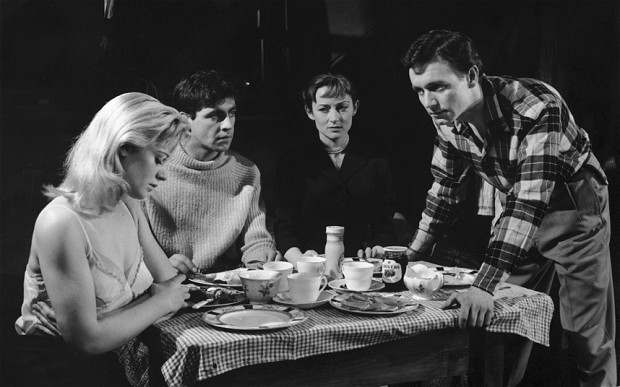 Dexter, Season 8, Episode 12, ‘Remember the Monsters?’
Dexter, Season 8, Episode 12, ‘Remember the Monsters?’
Written By Scott Buck & Manny Coto
Directed By Steve Shill
Airs Sundays, 8pm on Showtime
When you begin dreading the final episode of a show you love, it should really be an understandable reaction, one born out of fear and sadness that it is coming to end. Thanks to a collective brain melting session in the offices of Showtime’s Dexter however, this dread has come about due to the pessimistic angst that the closing chapter, the final lines, will be utterly botched and thus conclude the tainting of a once grand story with amateur nonsense. There’s no doubting that the awful quality of Season Eight has left an indelible mark, meaning that anyone going into the grand finale should be wary of being hopeful. Bearing no expectations is probably the best way to go into ‘Remember the Monsters’. Doing that, perversely, means you will actually get a hell of a lot out of it. In a twist greater than anything the show could present in-universe, the finale is actually, honestly, pretty damn good.
The spokes of the bike have been well and truly obstructed; Dexter heads to the airport with Harrison ready for his new life abroad alongside Hannah, blissfully unaware that sister Debra has been shot, his quarry Saxon is on the loose once more, and pesky PI Elway is on his tail. Desperate measures to keep those he loves out of harm’s way grounds him in Miami and means he has to face up to the consequences of his very nature, from taking defensive measures to looking at himself in a mirror darkly, truly assessing what is the best outcome. Chances are nobody, not even the genius Dex, can see what is coming.
It’s this strain of unpredictability that will doubtless dominate discussion, and spark some controversy, since the show ends on a note that not only contradicts trusted spoiler material but also the greater predictions of hardcore fans. Everything from the big emotional climax, one that is almost unbearably cruel and brutal, to the unthinkably genius final scene, is fodder for heated debate. The greatest testimony one can pay to the decisions made is that they are not cheap and easy, obvious or facetious. In many ways, the direction taken is bold and daring, very liable to be met with hostility but none the less one that actually fits the show’s ethos right down to the ground. The mood as the end credits roll for the last time is one of sadness, not shock, not elation.
That’s not to say that it is perfect, but the duo of Scott Buck and Manny Coto make damn good work of proving that they are capable of much better things that the last few weeks have suggested. As a standalone episode, ‘Remember the Monsters?’ is easily the best written and best directed of Season Eight and shows an attention to detail which had been glaringly absent in the build up. This means that goodbyes feel more meaningful, the nicely judged flashback scenes featuring Dexter and Debra are more emotionally poignant, and the action flows naturally and succinctly in tandem with the plot. Although something of a Deus Ex Machina, the storm is used well, Saxon is deployed far more effectively as a truly nasty villain, and each trick of the trade employed by the characters is smart and well executed. There are also some nice, subtle references to the past, always a welcome feature.
It is not, however, a grand finale in the finer sense of the term, and anyone expecting a mass charge by characters from Dexter’s past should dissuade themselves of such notions before viewing. Although there are a couple of twists in the tail, only one of them is truly shocking…in fact this particular choice is not a Shyamalan game changer, it is pure Diabolus Ex Machina, one that is very nearly unfair on both the fans and the characters. The same kind of mentality is used to bring about the real ending, one that admittedly does use some brief deception to hide itself in the final frames. It offers a superb call back to the first ever episode, and makes sure that there is no happy ending to Dexter’s story. Just the way it should be, really. There’s no redeeming what Dex is, what he’s done and caused, so having him ride off in to the sunset would be unsuitably naïve. His final decision, and the events that reinforce it, show that although he has been dumb this season, he is not entirely stupid overall; that small degree of self-loathing in his twisted psyche wins out for the good of others.
The great loss that cements this choice is heartbreaking, both in its nature and the way it is portrayed and the fact that Steve Shill has come in and actually offered some kind of creative enterprise to the direction is a huge relief. Daniel Licht’s music is used very well throughout the episode, while visually certain moments are beautiful to look at. It means that the one huge moment, one great scene, actually has the sense of significance and emotional heft to get a reaction from the audience. It’s also worth noting, from a writing point of view, that the decision Dexter makes has been long since foreshadowed by a seemingly throwaway exchange during Season Three, back in the show’s heyday. The final voyage of the Slice of Life is one that should draw some tears from those diehards who have been on this journey since Dex first said “Tonight’s the night”.
This should really apply to the entire episode, however, which is an indictment of the fact that it is the first time that the real Dexter has surfaced in months. No matter how much you appreciate the choices made, or cry at the drama presented, it cannot be denied that the impact of the finale has been substantially diminished by the fact that the preceding chapters were so unbearable. It is a positive bonus that Elway and Saxon are used well, written well and actually have some substance, but nothing more since they were slaves to contrivance and plot previously. Having characters react realistically, Batista scrutinizing when the cause arises, doesn’t make up for the fact that a couple of episodes later he wouldn’t have cared. The reason Season Four’s ending was so powerful was because it wrapped up a beautifully constructed story. Season Eight’s ending merely pulls out all the stops to make sure fans aren’t disappointed. What should have been a colossal event ends up feeling like a generous consolation prize.
The ending chosen also doesn’t bear the signs of long term planning, which is understandable given that the show never began with a set ending in mind other than personal ambitions, and the fact that the season was so badly plotted out suggests that the writers were working on the fly and thus constricted in what they could do. Focus dilly dallied from episode to episode as characters were introduced, built up, killed and forgotten about in a chaotic fashion, potential arcs and themes disposed of early in favor of fresh blood that, typically, was then spilled a couple of weeks later. It means that ‘Remember the Monsters?’ has no real relation to the Season opener, and that the late Evelyn Vogel’s only real impact in retrospect was being the cause of the season’s poorly conceived villain, who in turn is only significant for an event he causes that could have happened any other way. Let’s make no mountains out of mole hills here; Season Eight was a terrible final season, an utter disgrace to the show, and the ending was sullied as a result.
It’s more than a shame because from the evidence of said ending, it could and should have been much better. The episode is driven by a strong, complex central performance by Michael C. Hall, who had previously been criticized for the first time in the show’s run. Jennifer Carpenter, always golden regardless of the script, plays her A game here and there is also a dark horse heartbreaking display by Desmond Harrington, showing a vulnerable side to Quinn that we haven’t seen before. Sadly, there is no second shot at a send off for Harry. James Remar, tragically, marked his last appearance with a terribly carried out goodbye in the dreadful previous episode, and it is this sort of regret that boils the blood more than simply wasted air time.
Always working against circumstance, Dexter’s finale unfortunately wasn’t able to generate enough power to give a truly appropriate send off to the show, one that could satisfy and spoil its fans in the manner they once upon a time took for granted. It is, however, as good as can be expected given that it followed up a series in severe decline and is still able to tug at the heartstrings and offer a conclusion that, while perhaps not bound to be universally loved, at least takes a stand and holds its ground. Few shows manage to create an unforgettable ending, and Dexter is not one of them. But what it did do was remove its head from the sand and produce an hour reminiscent of better times, even as the events on screen reminded us of what is now lost from those days. One person in particular will be mourned as dearly as the lost quality.
Last night was the night, for the last time. It may not have been special, but it was good enough to say goodbye on. All things considered, that was better than any of us could have hoped for.
Scott Patterson







